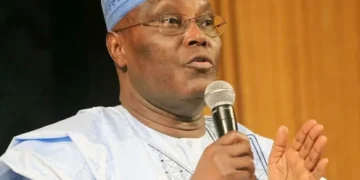Nigeria’s oil sector, the lifeblood of its economy, is grappling with a burgeoning crisis as a staggering 92 million barrels of crude oil, slated for export in April and May 2025, remain without buyers, according to exclusive data obtained by SPEARNEWS.
The backlog is casting a shadow over the oil revenue, which accounts for 90 percent of Nigeria’s export earnings and N19.6 trillion, up to 56 percent of the initially projected N34.8 trillion revenue. This reflects Nigeria’s heavy reliance on oil for fiscal sustainability.
Data obtained by SPEARNEWS showed that over half of Nigeria’s scheduled crude oil cargoes for the upcoming months have failed to secure buyers.
About 77.9 million barrels were stranded and unsold for April, while another 13.8 million barrels for May loading are still floating in the high seas.
The total unsold volume, estimated at over 80 million barrels, is derived from the sum of all available cargoes listed in the document.
These cargoes span a wide range of crude grades, including popular blends like Bonny Lite, Forcados, Qua Iboe, and Escravos, as well as lesser-known grades such as Djeno, Girassol, and Mostarda.
The sheer diversity of unsold grades suggests that the issue is not confined to a specific type of crude but is a systemic problem affecting Nigeria’s entire oil export portfolio.
Experts admit that while Nigeria’s high-grade crude oil is internationally recognised for its quality, the current market dynamics, characterised by persistently lower global crude oil prices and an increasingly competitive landscape, are reportedly creating a formidable hurdle for Nigerian oil marketers.
“Some JV partners are holding out for prices to reach at least $70 per barrel,” a senior economist familiar with oil business told BusinessDay.
He added, “Market trends suggest prices may remain stagnant or even drop back to the $60 support level. Holding out for higher prices without accounting for potential oversupply issues or demurrage costs from vessels on standby (‘laycan’) clearly reflects poor planning and a lack of effective hedging strategies.”
Brent crude prices plummeted more than 20 percent within a week, falling from $74.95 on April 2 to $58.46 per barrel on April 9, before recovering to approximately $66 by April 24.
The average price of Nigerian major oil blends on Thursday was $69 per barrel, approximately $3 higher than the benchmark Brent Crude.
Farouk Ahmed, CEO of the Nigerian Midstream and Downstream Petroleum Regulatory Authority, remarked that the country’s economy is grappling with the ongoing volatility of the global oil markets.
He noted that Nigeria, heavily reliant on oil exports, would encounter serious economic consequences, while the Nigerian populace might benefit from decreasing prices for petroleum products.
“Although we, as consumers, appreciate the price drop, it is detrimental to our economy as our revenue inflows are also affected,” Ahmed stated.
Global markets are currently uncertain due to Trump’s aggressive trade policies, which feature sweeping tariffs on goods from several countries, primarily China, alongside threats of tariffs on other nations.
Crude oil prices have fluctuated because of these policies, which have often been announced or reversed abruptly, disrupting supply chains and investor confidence.
UBS, BNP Paribas, and HSBC are among the international banks that have adjusted their crude price projections downward due to the uncertainties surrounding trade tensions.
In the escalating trade war between the world’s two largest economies, which is intensifying market fears of a global recession, Trump has increased tariffs on Chinese goods to crippling levels, prompting China to impose retaliatory tariffs on U.S. imports.
The oil market is susceptible to geopolitical tensions and shifts in demand as Trump’s tariffs and waivers influence economic forecasts.
Oil-dependent economies like Nigeria depend on stable crude prices for revenue; such volatility complicates long-term planning.
Nigeria’s recent addition of its medium-sweet crude grades, joining Forcados, Escravos, and Bonga, represents another significant step in the country’s ongoing efforts to diversify its crude offerings, according to Argus Media.
Obodo, a new Nigerian crude grade, was launched in April and primarily targets the European market. European refineries are expected to be attracted to Obodo. Seasonal maintenance is projected to conclude by the end of next month, with European refineries preparing to increase operations.
Experts have called on Nigeria’s oil regulator to prioritise local refining even as the nation grapples with an estimated 92 million barrels of stranded crude oil on the high seas.
Under Sections 8(c) and 109 of the PIA, the Domestic Crude Supply Obligations (DCSO) require producers to sell crude oil to Nigerian refineries to ensure adequate feedstock for domestic refining.
The Crude Oil Refinery-owners Association of Nigeria (CORAN) has repeatedly criticised the regulatory regime for failing to allocate sufficient crude to local refineries. The group argues that preference is still given to the issuance of fuel import licences over supporting domestic refining.
Read also: Troops foil oil theft worth over ₦536 million, recover 392,174 litres of stolen crude oil in major crackdown.
Eche Idoko, national publicity secretary, CORAN, recently disclosed that crude supply shortages have stalled the progress of at least seven refineries.
“The major challenge is availability of crude,” said Idoko. “Until recently, Nigeria was not even meeting its OPEC production quota. For refineries to reach Final Investment Decision (FID) stages, they need guaranteed feedstock. The situation right now is not helping our case.”
He added that refineries such as the Edo Refinery, which plans to expand to 30,000 barrels per day, are now in talks with US-based crude suppliers. Only a few like Walter Smith Refinery and Aradel Energy, which operate on their own marginal fields, are able to refine intermittently.
“Other modular refineries have not refined a single litre in the last six to eight months,” Idoko said.
Oladehinde Oladipo
Dipo Oladehinde is a skilled energy analyst with experience across Nigeria’s energy sector alongside relevant know-how about Nigeria’s macro economy. He provides a blend of market intelligence, financial analysis, industry insight, micro and macro-level analysis of a wide range of local and international issues as well as informed technical rudiments for policy-making and private directions.









































Discussion about this post